ITECH 1100: Exploring VR's revolutionary potential in music recording
VerifiedAdded on 2023/04/24
|8
|1580
|140
Report
AI Summary
This report analyzes the potential impact of Virtual Reality (VR) on the music recording industry, focusing on its disruptive influence in music videos, music education, and artist opportunities. It delves into the regulatory and ethical considerations surrounding VR's integration into music education, highlighting market dynamics, legal frameworks, architectural considerations, and social norms. The report further examines how VR technology can enhance learning outcomes, redefine music creation perceptions, and foster social culture within communities. Ultimately, VR is portrayed as a transformative force capable of revolutionizing music broadcasting, audience engagement, and overall music experiences, paving the way for innovative concerts and interactive musical content. The document is available on Desklib, a platform providing study tools for students including past papers and solved assignments.
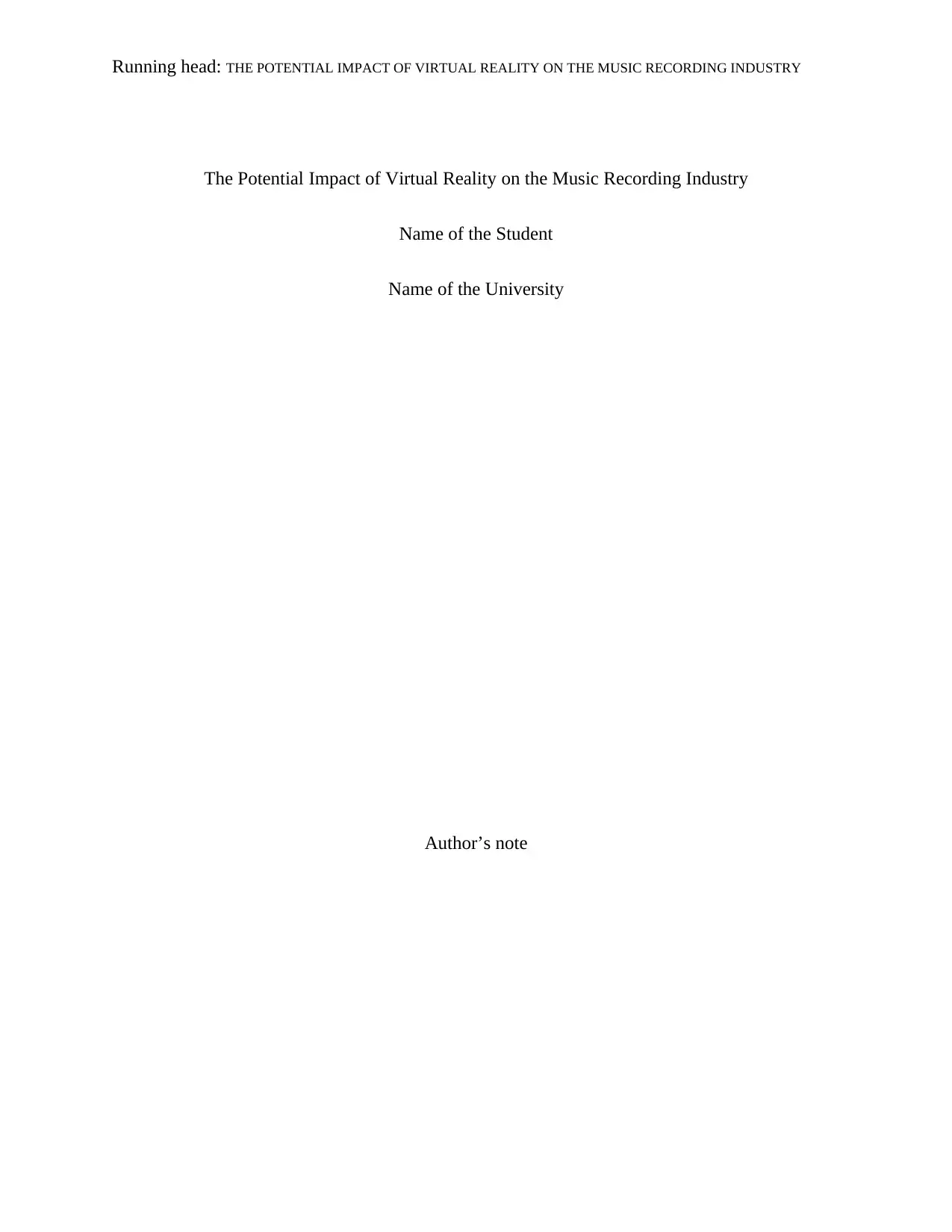
Running head: THE POTENTIAL IMPACT OF VIRTUAL REALITY ON THE MUSIC RECORDING INDUSTRY
The Potential Impact of Virtual Reality on the Music Recording Industry
Name of the Student
Name of the University
Author’s note
The Potential Impact of Virtual Reality on the Music Recording Industry
Name of the Student
Name of the University
Author’s note
Paraphrase This Document
Need a fresh take? Get an instant paraphrase of this document with our AI Paraphraser
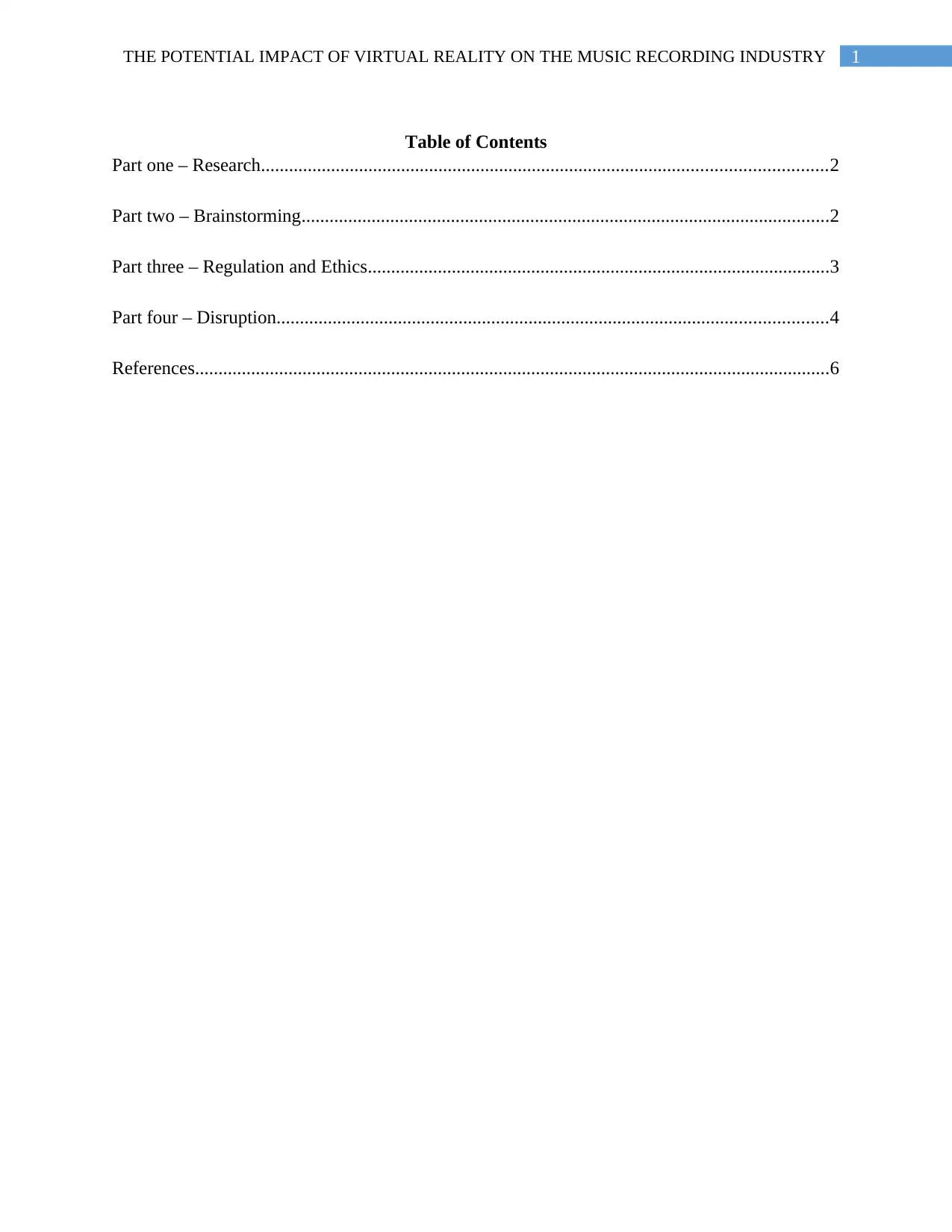
1THE POTENTIAL IMPACT OF VIRTUAL REALITY ON THE MUSIC RECORDING INDUSTRY
Table of Contents
Part one – Research.........................................................................................................................2
Part two – Brainstorming.................................................................................................................2
Part three – Regulation and Ethics...................................................................................................3
Part four – Disruption......................................................................................................................4
References........................................................................................................................................6
Table of Contents
Part one – Research.........................................................................................................................2
Part two – Brainstorming.................................................................................................................2
Part three – Regulation and Ethics...................................................................................................3
Part four – Disruption......................................................................................................................4
References........................................................................................................................................6
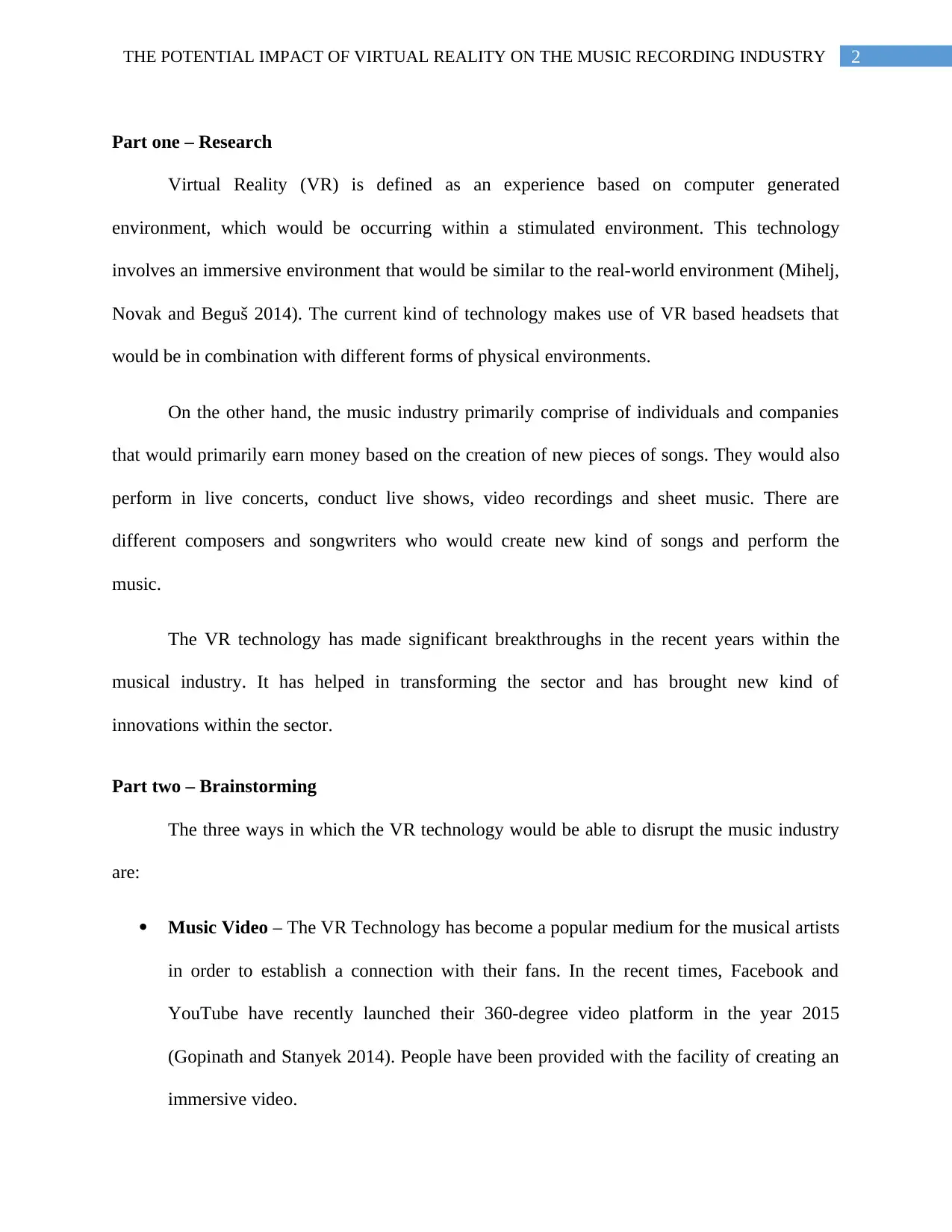
2THE POTENTIAL IMPACT OF VIRTUAL REALITY ON THE MUSIC RECORDING INDUSTRY
Part one – Research
Virtual Reality (VR) is defined as an experience based on computer generated
environment, which would be occurring within a stimulated environment. This technology
involves an immersive environment that would be similar to the real-world environment (Mihelj,
Novak and Beguš 2014). The current kind of technology makes use of VR based headsets that
would be in combination with different forms of physical environments.
On the other hand, the music industry primarily comprise of individuals and companies
that would primarily earn money based on the creation of new pieces of songs. They would also
perform in live concerts, conduct live shows, video recordings and sheet music. There are
different composers and songwriters who would create new kind of songs and perform the
music.
The VR technology has made significant breakthroughs in the recent years within the
musical industry. It has helped in transforming the sector and has brought new kind of
innovations within the sector.
Part two – Brainstorming
The three ways in which the VR technology would be able to disrupt the music industry
are:
Music Video – The VR Technology has become a popular medium for the musical artists
in order to establish a connection with their fans. In the recent times, Facebook and
YouTube have recently launched their 360-degree video platform in the year 2015
(Gopinath and Stanyek 2014). People have been provided with the facility of creating an
immersive video.
Part one – Research
Virtual Reality (VR) is defined as an experience based on computer generated
environment, which would be occurring within a stimulated environment. This technology
involves an immersive environment that would be similar to the real-world environment (Mihelj,
Novak and Beguš 2014). The current kind of technology makes use of VR based headsets that
would be in combination with different forms of physical environments.
On the other hand, the music industry primarily comprise of individuals and companies
that would primarily earn money based on the creation of new pieces of songs. They would also
perform in live concerts, conduct live shows, video recordings and sheet music. There are
different composers and songwriters who would create new kind of songs and perform the
music.
The VR technology has made significant breakthroughs in the recent years within the
musical industry. It has helped in transforming the sector and has brought new kind of
innovations within the sector.
Part two – Brainstorming
The three ways in which the VR technology would be able to disrupt the music industry
are:
Music Video – The VR Technology has become a popular medium for the musical artists
in order to establish a connection with their fans. In the recent times, Facebook and
YouTube have recently launched their 360-degree video platform in the year 2015
(Gopinath and Stanyek 2014). People have been provided with the facility of creating an
immersive video.
⊘ This is a preview!⊘
Do you want full access?
Subscribe today to unlock all pages.

Trusted by 1+ million students worldwide
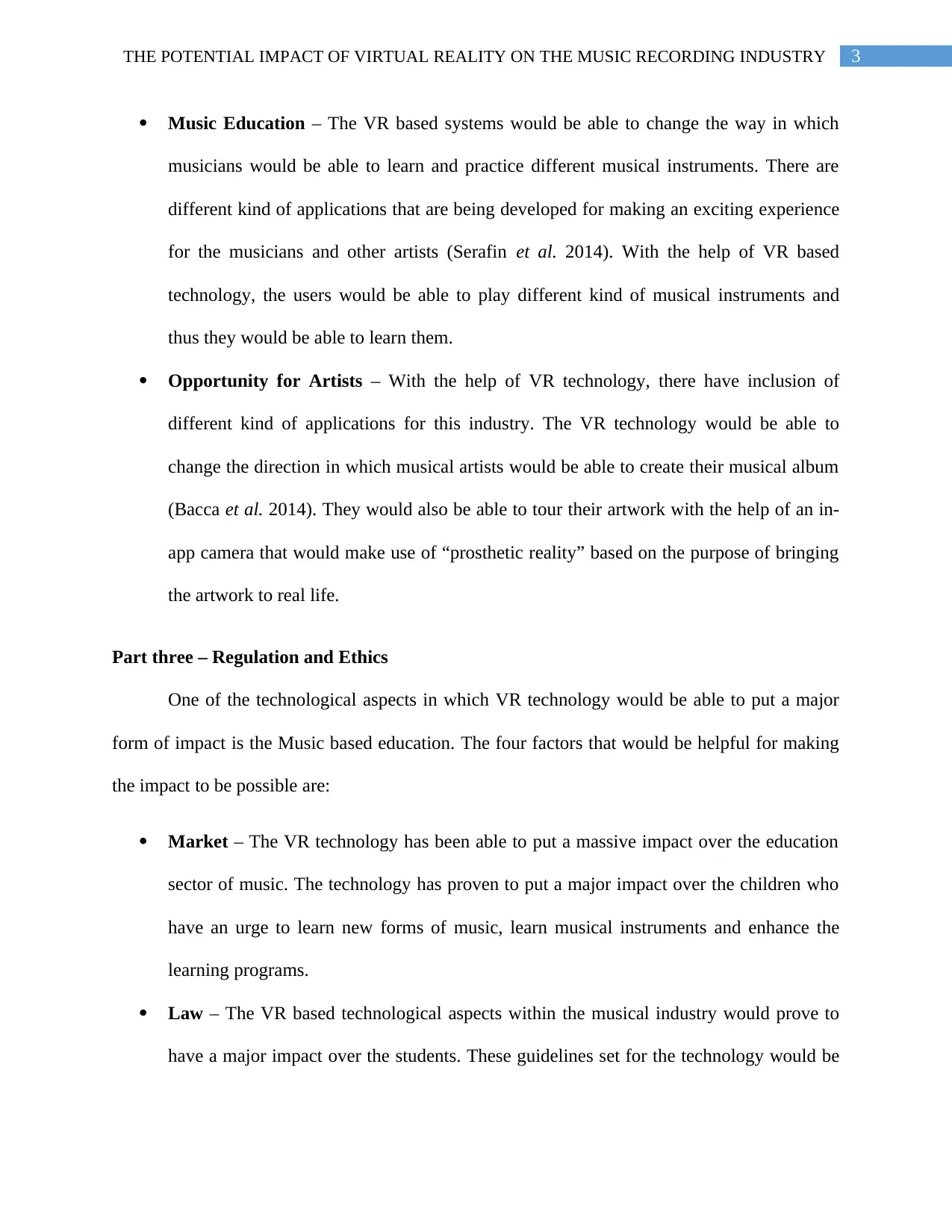
3THE POTENTIAL IMPACT OF VIRTUAL REALITY ON THE MUSIC RECORDING INDUSTRY
Music Education – The VR based systems would be able to change the way in which
musicians would be able to learn and practice different musical instruments. There are
different kind of applications that are being developed for making an exciting experience
for the musicians and other artists (Serafin et al. 2014). With the help of VR based
technology, the users would be able to play different kind of musical instruments and
thus they would be able to learn them.
Opportunity for Artists – With the help of VR technology, there have inclusion of
different kind of applications for this industry. The VR technology would be able to
change the direction in which musical artists would be able to create their musical album
(Bacca et al. 2014). They would also be able to tour their artwork with the help of an in-
app camera that would make use of “prosthetic reality” based on the purpose of bringing
the artwork to real life.
Part three – Regulation and Ethics
One of the technological aspects in which VR technology would be able to put a major
form of impact is the Music based education. The four factors that would be helpful for making
the impact to be possible are:
Market – The VR technology has been able to put a massive impact over the education
sector of music. The technology has proven to put a major impact over the children who
have an urge to learn new forms of music, learn musical instruments and enhance the
learning programs.
Law – The VR based technological aspects within the musical industry would prove to
have a major impact over the students. These guidelines set for the technology would be
Music Education – The VR based systems would be able to change the way in which
musicians would be able to learn and practice different musical instruments. There are
different kind of applications that are being developed for making an exciting experience
for the musicians and other artists (Serafin et al. 2014). With the help of VR based
technology, the users would be able to play different kind of musical instruments and
thus they would be able to learn them.
Opportunity for Artists – With the help of VR technology, there have inclusion of
different kind of applications for this industry. The VR technology would be able to
change the direction in which musical artists would be able to create their musical album
(Bacca et al. 2014). They would also be able to tour their artwork with the help of an in-
app camera that would make use of “prosthetic reality” based on the purpose of bringing
the artwork to real life.
Part three – Regulation and Ethics
One of the technological aspects in which VR technology would be able to put a major
form of impact is the Music based education. The four factors that would be helpful for making
the impact to be possible are:
Market – The VR technology has been able to put a massive impact over the education
sector of music. The technology has proven to put a major impact over the children who
have an urge to learn new forms of music, learn musical instruments and enhance the
learning programs.
Law – The VR based technological aspects within the musical industry would prove to
have a major impact over the students. These guidelines set for the technology would be
Paraphrase This Document
Need a fresh take? Get an instant paraphrase of this document with our AI Paraphraser
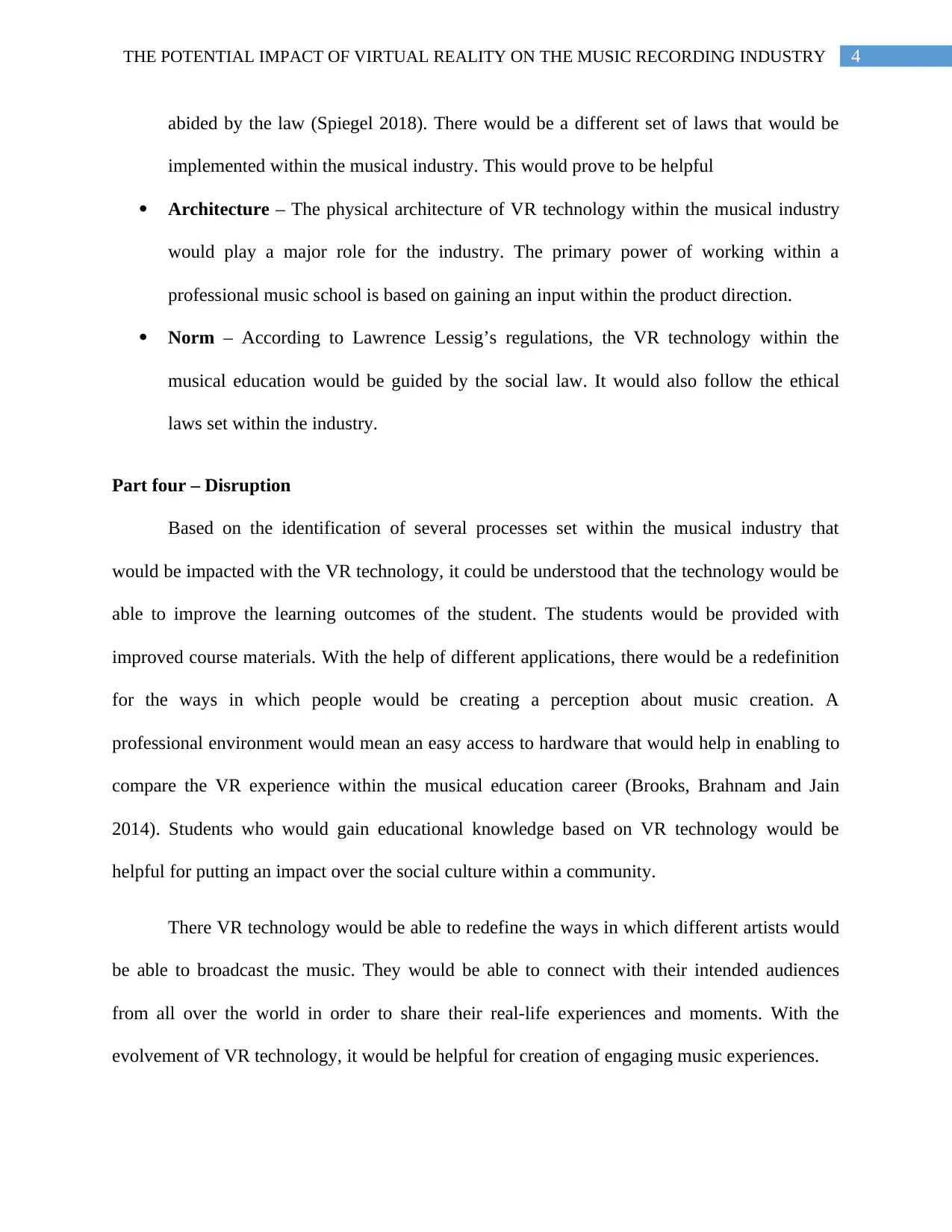
4THE POTENTIAL IMPACT OF VIRTUAL REALITY ON THE MUSIC RECORDING INDUSTRY
abided by the law (Spiegel 2018). There would be a different set of laws that would be
implemented within the musical industry. This would prove to be helpful
Architecture – The physical architecture of VR technology within the musical industry
would play a major role for the industry. The primary power of working within a
professional music school is based on gaining an input within the product direction.
Norm – According to Lawrence Lessig’s regulations, the VR technology within the
musical education would be guided by the social law. It would also follow the ethical
laws set within the industry.
Part four – Disruption
Based on the identification of several processes set within the musical industry that
would be impacted with the VR technology, it could be understood that the technology would be
able to improve the learning outcomes of the student. The students would be provided with
improved course materials. With the help of different applications, there would be a redefinition
for the ways in which people would be creating a perception about music creation. A
professional environment would mean an easy access to hardware that would help in enabling to
compare the VR experience within the musical education career (Brooks, Brahnam and Jain
2014). Students who would gain educational knowledge based on VR technology would be
helpful for putting an impact over the social culture within a community.
There VR technology would be able to redefine the ways in which different artists would
be able to broadcast the music. They would be able to connect with their intended audiences
from all over the world in order to share their real-life experiences and moments. With the
evolvement of VR technology, it would be helpful for creation of engaging music experiences.
abided by the law (Spiegel 2018). There would be a different set of laws that would be
implemented within the musical industry. This would prove to be helpful
Architecture – The physical architecture of VR technology within the musical industry
would play a major role for the industry. The primary power of working within a
professional music school is based on gaining an input within the product direction.
Norm – According to Lawrence Lessig’s regulations, the VR technology within the
musical education would be guided by the social law. It would also follow the ethical
laws set within the industry.
Part four – Disruption
Based on the identification of several processes set within the musical industry that
would be impacted with the VR technology, it could be understood that the technology would be
able to improve the learning outcomes of the student. The students would be provided with
improved course materials. With the help of different applications, there would be a redefinition
for the ways in which people would be creating a perception about music creation. A
professional environment would mean an easy access to hardware that would help in enabling to
compare the VR experience within the musical education career (Brooks, Brahnam and Jain
2014). Students who would gain educational knowledge based on VR technology would be
helpful for putting an impact over the social culture within a community.
There VR technology would be able to redefine the ways in which different artists would
be able to broadcast the music. They would be able to connect with their intended audiences
from all over the world in order to share their real-life experiences and moments. With the
evolvement of VR technology, it would be helpful for creation of engaging music experiences.
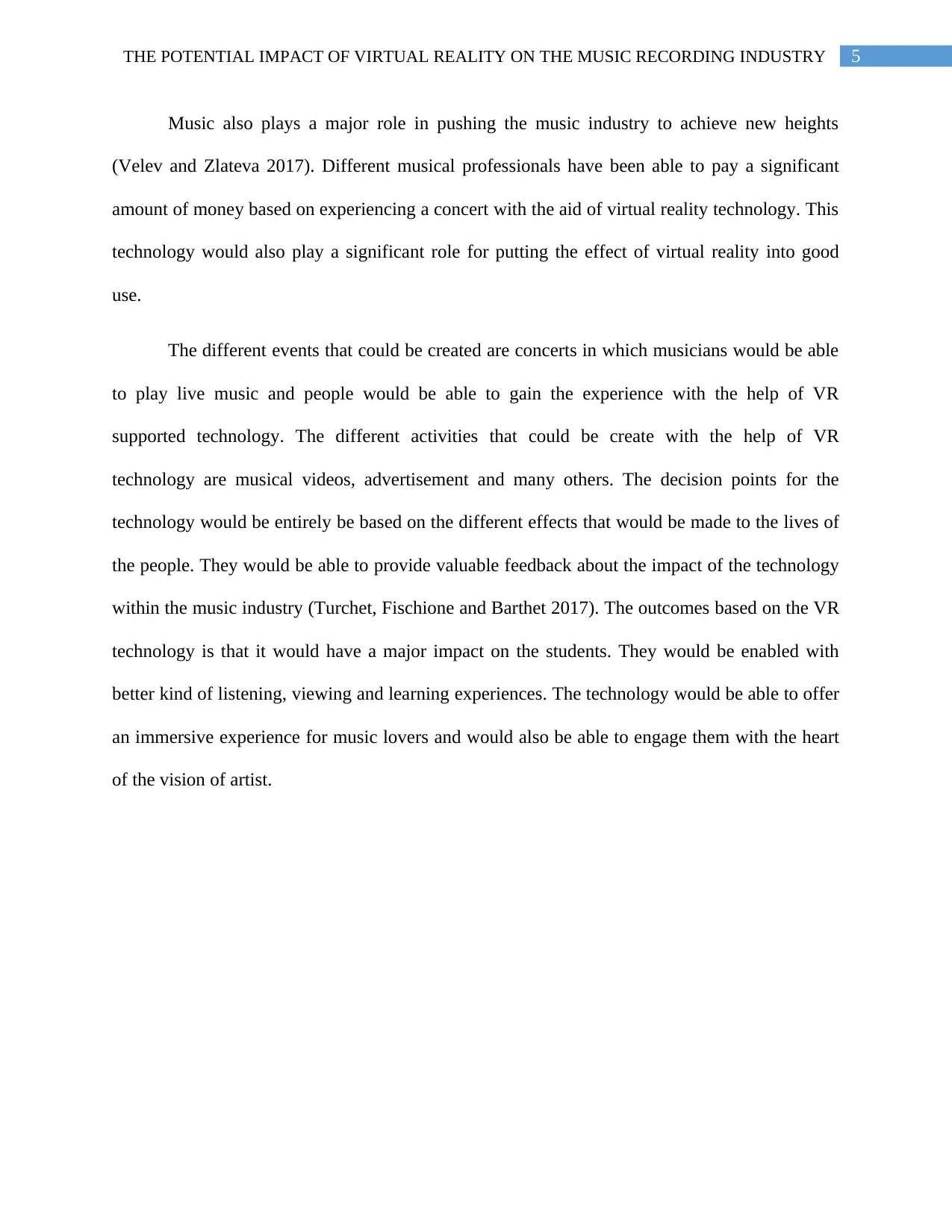
5THE POTENTIAL IMPACT OF VIRTUAL REALITY ON THE MUSIC RECORDING INDUSTRY
Music also plays a major role in pushing the music industry to achieve new heights
(Velev and Zlateva 2017). Different musical professionals have been able to pay a significant
amount of money based on experiencing a concert with the aid of virtual reality technology. This
technology would also play a significant role for putting the effect of virtual reality into good
use.
The different events that could be created are concerts in which musicians would be able
to play live music and people would be able to gain the experience with the help of VR
supported technology. The different activities that could be create with the help of VR
technology are musical videos, advertisement and many others. The decision points for the
technology would be entirely be based on the different effects that would be made to the lives of
the people. They would be able to provide valuable feedback about the impact of the technology
within the music industry (Turchet, Fischione and Barthet 2017). The outcomes based on the VR
technology is that it would have a major impact on the students. They would be enabled with
better kind of listening, viewing and learning experiences. The technology would be able to offer
an immersive experience for music lovers and would also be able to engage them with the heart
of the vision of artist.
Music also plays a major role in pushing the music industry to achieve new heights
(Velev and Zlateva 2017). Different musical professionals have been able to pay a significant
amount of money based on experiencing a concert with the aid of virtual reality technology. This
technology would also play a significant role for putting the effect of virtual reality into good
use.
The different events that could be created are concerts in which musicians would be able
to play live music and people would be able to gain the experience with the help of VR
supported technology. The different activities that could be create with the help of VR
technology are musical videos, advertisement and many others. The decision points for the
technology would be entirely be based on the different effects that would be made to the lives of
the people. They would be able to provide valuable feedback about the impact of the technology
within the music industry (Turchet, Fischione and Barthet 2017). The outcomes based on the VR
technology is that it would have a major impact on the students. They would be enabled with
better kind of listening, viewing and learning experiences. The technology would be able to offer
an immersive experience for music lovers and would also be able to engage them with the heart
of the vision of artist.
⊘ This is a preview!⊘
Do you want full access?
Subscribe today to unlock all pages.

Trusted by 1+ million students worldwide
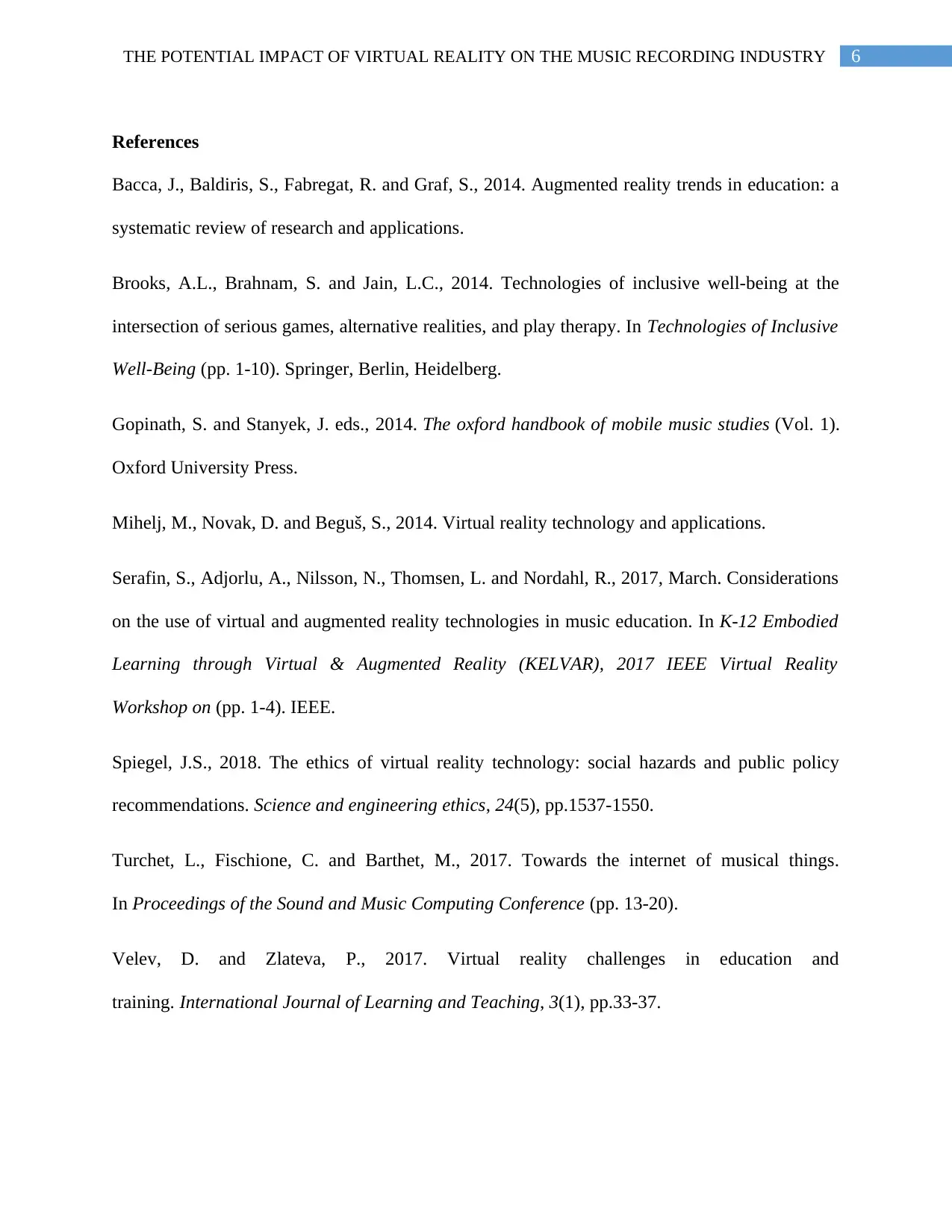
6THE POTENTIAL IMPACT OF VIRTUAL REALITY ON THE MUSIC RECORDING INDUSTRY
References
Bacca, J., Baldiris, S., Fabregat, R. and Graf, S., 2014. Augmented reality trends in education: a
systematic review of research and applications.
Brooks, A.L., Brahnam, S. and Jain, L.C., 2014. Technologies of inclusive well-being at the
intersection of serious games, alternative realities, and play therapy. In Technologies of Inclusive
Well-Being (pp. 1-10). Springer, Berlin, Heidelberg.
Gopinath, S. and Stanyek, J. eds., 2014. The oxford handbook of mobile music studies (Vol. 1).
Oxford University Press.
Mihelj, M., Novak, D. and Beguš, S., 2014. Virtual reality technology and applications.
Serafin, S., Adjorlu, A., Nilsson, N., Thomsen, L. and Nordahl, R., 2017, March. Considerations
on the use of virtual and augmented reality technologies in music education. In K-12 Embodied
Learning through Virtual & Augmented Reality (KELVAR), 2017 IEEE Virtual Reality
Workshop on (pp. 1-4). IEEE.
Spiegel, J.S., 2018. The ethics of virtual reality technology: social hazards and public policy
recommendations. Science and engineering ethics, 24(5), pp.1537-1550.
Turchet, L., Fischione, C. and Barthet, M., 2017. Towards the internet of musical things.
In Proceedings of the Sound and Music Computing Conference (pp. 13-20).
Velev, D. and Zlateva, P., 2017. Virtual reality challenges in education and
training. International Journal of Learning and Teaching, 3(1), pp.33-37.
References
Bacca, J., Baldiris, S., Fabregat, R. and Graf, S., 2014. Augmented reality trends in education: a
systematic review of research and applications.
Brooks, A.L., Brahnam, S. and Jain, L.C., 2014. Technologies of inclusive well-being at the
intersection of serious games, alternative realities, and play therapy. In Technologies of Inclusive
Well-Being (pp. 1-10). Springer, Berlin, Heidelberg.
Gopinath, S. and Stanyek, J. eds., 2014. The oxford handbook of mobile music studies (Vol. 1).
Oxford University Press.
Mihelj, M., Novak, D. and Beguš, S., 2014. Virtual reality technology and applications.
Serafin, S., Adjorlu, A., Nilsson, N., Thomsen, L. and Nordahl, R., 2017, March. Considerations
on the use of virtual and augmented reality technologies in music education. In K-12 Embodied
Learning through Virtual & Augmented Reality (KELVAR), 2017 IEEE Virtual Reality
Workshop on (pp. 1-4). IEEE.
Spiegel, J.S., 2018. The ethics of virtual reality technology: social hazards and public policy
recommendations. Science and engineering ethics, 24(5), pp.1537-1550.
Turchet, L., Fischione, C. and Barthet, M., 2017. Towards the internet of musical things.
In Proceedings of the Sound and Music Computing Conference (pp. 13-20).
Velev, D. and Zlateva, P., 2017. Virtual reality challenges in education and
training. International Journal of Learning and Teaching, 3(1), pp.33-37.
Paraphrase This Document
Need a fresh take? Get an instant paraphrase of this document with our AI Paraphraser

7THE POTENTIAL IMPACT OF VIRTUAL REALITY ON THE MUSIC RECORDING INDUSTRY
1 out of 8
Related Documents
Your All-in-One AI-Powered Toolkit for Academic Success.
+13062052269
info@desklib.com
Available 24*7 on WhatsApp / Email
![[object Object]](/_next/static/media/star-bottom.7253800d.svg)
Unlock your academic potential
Copyright © 2020–2026 A2Z Services. All Rights Reserved. Developed and managed by ZUCOL.





